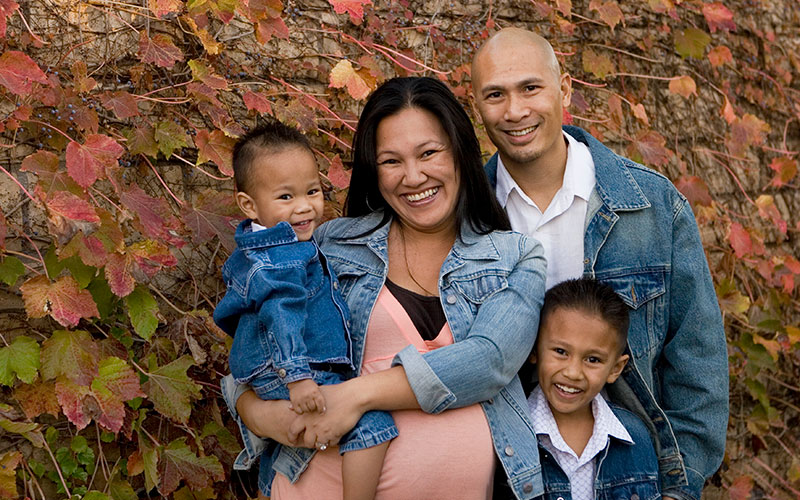There are many common misconceptions around refugees and asylum seekers, both in our community and on a wider scale.
At CatholicCare Victoria we advocate for the needs and rights of refugees and asylum seekers, and this includes improving knowledge, dispelling myths and creating dialogue within our local communities.
So firstly, what is the difference between a refugee and an asylum seeker?
Definition of an asylum seeker
An asylum seeker is a person who has fled war, civil unrest, violence or persecution to find refuge in another country, but whose request for asylum has not yet been granted.
Definition of a refugee
A refugee is also a person who has fled war, civil unrest, violence or persecution to find refuge in another country*, but who HAS been granted asylum.
The Australian Red Cross explains that “Not every asylum seeker becomes a refugee, but every refugee starts out as an asylum seeker.”²
This means that the key difference between a refugee and an asylum seeker is whether their request for asylum has been processed or not.

A person may arrive in Australia either as a refugee or an asylum seeker, depending on whether they have been granted asylum before their arrival. It can take several years for an asylum seeker to be processed and granted asylum in Australia.
Now with the basics out of the way, here are answers to Google’s 12 other most-searched questions on refugees and asylum seekers!
Why do refugees…
Why do refugees leave their country?
Refugees leave their country to flee from war and civil unrest, and to escape the threat of persecution. Many have suffered trauma and the loss of loved ones, and fear for their own lives and for the lives of their family. In addition to this, refugees may also be in search of a better future for them and their loved ones – the opportunity to study and choose a career path, and to be treated fairly.
Why do refugees choose to come to Australia?
A refugee’s resettlement destination is not always a choice made by refugees themselves. Choices of destination (or knowledge of available destinations) are often very limited or non-existent, and choices are dependent on factors such as finances available, geography, available travel routes, visa options, and networks/routes used by people smugglers. The Parliament of Australia website also notes that “where refugees and asylum-seekers are able to make their own decisions regarding destination countries, their choices are heavily influenced by the existence of social and family networks in the destination country.”³
Can refugees…
Can refugees work and study in Australia?
Yes, refugees can work in Australia because their refugee status means they have been granted asylum through a visa (either for permanent or temporary residence). Protection visas, refugee category visas, and temporary protections visas are three examples of visas that allow people to work and study in Australia⁴. Refugees who have been granted permanent residency can also apply to become Australian citizens under the same rules as other permanent residents.
Asylum seekers who arrived in Australia by boat after 13 August 2012 and who hold a bridging visa are not permitted to work. A bridging visa is a temporary visa allowing asylum seekers to legally reside in Australia while their claim for protection is being assessed⁵.
Can refugees access Centrelink?
Yes, refugees can access government payments and assistance if they are holders of a permanent visa (for permanent residence in Australia). The Parliament of Australia website explains that “When an asylum seeker is granted refugee status they become permanent residents of Australia. They have the same entitlements as all other permanent residents. There are no special refugee payments or special rates of payments for refugees.”⁶
Do refugees…
Do refugees pay taxes?
Yes, tax applies to all applicable Australian residents including refugees.
Do refugees get free housing?
No, refugees are not automatically provided with free housing because of their refugee status.⁶ But refugees, just like all other Australian residents, can apply for housing supports if they are struggling and meet the eligibility criteria. Our settlement case workers at CatholicCare Victoria assist refugees to submit their applications for public housing programs.

How do refugees…
How do refugees come to Australia?
The Parliament of Australia website explains that “usually only a small proportion of asylum applicants in Australia arrive by boat—most arrive by air with a valid visa and then go on to pursue asylum claims.”¹
How do refugees contribute to the Australian community?
Refugees make a positive contribution to both their local communities and our community at large. They boost our economy and give back to society – and in the search for a better, safer life, many refugees also come to Australia with the hope of giving their children opportunities for study and career development. This means that future generations of refugees (and children with refugee backgrounds) help boost our economy and give back to society too.
Tent tells us that ‘Australia has benefited immeasurably from the contributions of people who arrived as refugees, across all aspects of society: business, the arts, science, sport, medicine, and the law…’⁷ The Refugee Council of Australia also states that refugees “contribute greatly to civic and community life. They volunteer, promote community development and engage in neighbourhood activities and events.”⁸
Refugees often hold skills, qualifications and practical experience from their home country, which is a great resource for Australian businesses.
How long do refugees…
How long do refugees stay in detention centres in Australia?
Refugees are people who have already been granted asylum, so it is mostly asylum seekers who are detained in Australian detention centres. Detention centres, more formally known as closed detention centres, are facilities where immigrants are detained for reasons such as the cancellation of their visa, character reasons/concerns, or because they sought asylum by boat.
As at 31 March 2021, the Australian Department of Home Affairs tells us that the average number of days people spend in closed detention centres is 641 days (equal to about 21 months or 1.76 years). But their statistics also show that 452 people currently in closed detention have spent more than two years there, and the total number of people in closed detention in Australia is 1,483 people.⁹
How long do refugees stay in camps
With refugee camps all around the world, there is no average time a refugee may spend in a refugee camp – this depends on the situation of the individual/family and the situation in their country of origin and country of current residence (e.g. war, civil unrest, etc).
But from our experience supporting refugees at CatholicCare Victoria, we’ve seen some refugees spend anything from several years to decades in refugee camps – and some refugees have been born in camps, living their whole life there until seeking asylum in Australia.
Are refugees…
Are refugees legal in Australia?
Yes, refugees living in Australia have been granted residence, which means they are legal residents. The Australian Human Rights Commission goes further to say that “Seeking asylum in Australia, or elsewhere, is not illegal. In fact, it is a basic human right. All people are entitled to protection of their human rights…”¹⁰
Are refugees citizens?
Refugees are not automatically given Australian citizenship, but refugees with permanent residency in Australia can apply to become an Australian citizen.
Due to the trauma and loss experienced by refugees, barriers such as language and health issues, and the fact that many arrive in Australia with little more than the clothes on their back, refugees are recognised as a vulnerable cohort.
At CatholicCare Victoria we support refugees and asylum seekers by addressing their settlement needs with practical support, and building their capacity to live independent, happy and fulfilling lives.
View Support Services
Donate Get Involved
For more information, facts and statistics on refugees and asylum seekers, visit the Refugee Council of Australia website.
Liz Gellel | Manager, External Marketing and Communications
*The 1951 Convention relating to the status of refugees defines a refugee as any person who: “… owing to well‐founded fear of being persecuted for reasons of race, religion, nationality, membership of a particular social group or political opinion, is outside the country of his nationality and is unable or, owing to such fear, is unwilling to avail himself of the protection of that country; or who, not having a nationality and being outside the country of his former habitual residence as a result of such events, is unable or, owing to such fear, is unwilling to return to it …”¹
Sources:
1. Asylum seekers and refugees: what are the facts?
2. Refugee and asylum seeker facts
3. Destination anywhere? Factors affecting asylum seekers’ choice of destination country
4. Visa list
5. Tell Me About: Bridging Visas for Asylum Seekers
6. Australian Government assistance to refugees: fact v fiction
7. Australian Employers’ Guide to Hiring Refugees
8. Do refugees contribute to Australian society?
9. Statistics on people in detention in Australia
10. Asylum seekers and refugees
11. Questions and Answers About Refugees & Asylum Seekers
12. A Guide for Employers